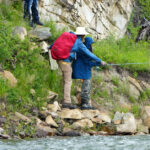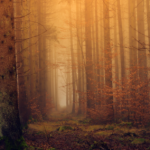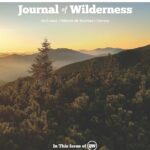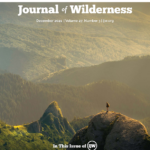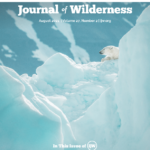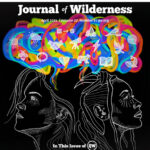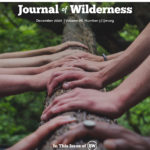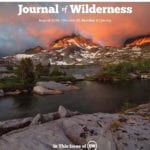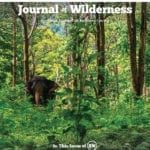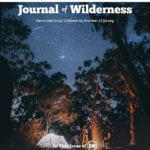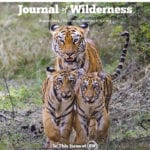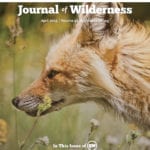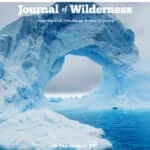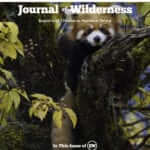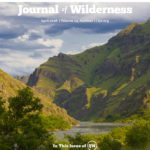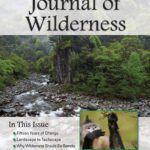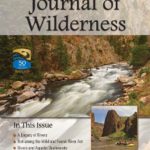Archived Issues
To expand your wilderness knowledge and target your action to protect wilderness, take advantage of the most extensive wilderness publications archive in the world, with free access to IJW issues that started in 1995!
December 2023
Read the International Journal of Wilderness, December 2023 double issue, with the theme Wilderness for a Diverse America.
June 2023
In this issue of IJW, we remember Dr. Kathy McKinnon, former chair of the IUCN World Commission on Protected Areas. Lisa Ronald and her coauthors investigate how we might make wilderness more welcoming by assessing barriers to inclusion. Jason Taylor and the Aldo Leopold Wilderness Research Institute staff present their 10-year wilderness science strategic plan. Howard Smith and others discuss shifting baseline syndrome among whitewater outfitters and guides. And Suyash Keshari and Bhavna Menon tell the story of India’s Tigers.
December 2022
In this issue of IJW, we remember Dave Foreman as a father tree for wilderness. Carol Lee and Tanya Dreizin investigate peer-driven social pressures for behavior in rock climbers. Keely Fisher examines virtual reality and the impact of wilderness conceptualizations. Gracie Dunlap describes living along¬side the Yawanawá. And John Shultis uses creative expression and the arts to demonstrate the impact of wild places.
August 2022
In this issue of IJW, Rebecca Rasch finds wildland advocates in unexpected places. Elena Thomas, Williams Rice, Jenn Thomsen, Jaclyn Rushing and Chris Armatas investigate constraints to wilderness recreation. Tina Tin documents wilderness area visitation during the COVID pandemic. And Marcus Hall, Wilko Graf von Hardenberg, Tina Tin, and Robert Dvorak reintroduce the Wilderness Babel project.In this issue of IJW, Roger Kaye examines what nature looks like in the Anthropocene. Janet McMahon describes biodiversity as the language of wilderness. Peter Pettengill, Roisin Creedon-Carey, and Sage Lalor discuss wilderness solitude in an era of isolation. And Elizabeth Perry explores the development of nature-based tourism in Oman.
April 2022
In this issue of IJW, Roger Kaye examines what nature looks like in the Anthropocene. Janet McMahon describes biodiversity as the language of wilderness. Peter Pettengill, Roisin Creedon-Carey, and Sage Lalor discuss wilderness solitude in an era of isolation. And Elizabeth Perry explores the development of nature-based tourism in Oman.
December 2021
In this issue of IJW, we remember George Stankey and his contributions to wilderness research and stewardship. Mark Anderson provides a synthesis of recent findings on carbon storage in old growth forests. Rosemary Evans examines prescribed burning in Britain’s moorlands. And Tobias Nickel presents a call for a standard definition of “Natural” in wilderness stewardship.
August 2021
In this issue, Roger Kaye discusses preserving wildness in the Anthropocene. Chris Armatas and others explore shared stewardship and partnerships through empathy. Howard Smith, Richard Discenza, and Robert Dvorak present a pandemic inspired research agenda. And Vladimir Bocharnikov and Evsey Kosman consider indicators for regional policy making in Russia.
April 2021
In this issue of IJW, Larry Beck and Dan Dustin interpret the evolution of John Muir’s legacy. Michelle Reilly examines the significant contributions of women to the wilderness preservation movement. Martha Bierut, Rebecca Niemiec, Randy Welsh, and Dave Cantrell analyze practices that enhance volunteer retention. And Amy Lewis discusses learning faster and better through global mentorship.
Book Review
Braiding Sweetgrass: Indigenous Wisdom, Scientific Knowledge, and the Teachings of Plants. by Robin Wall Kimmerer
December 2020
In this issue of IJW, we remember Michael Soulé and his contributions to conservation. Karen Mudar examines managing cultural resources in wilderness. Tyler Cribbs, Ryan Sharp, Matthew Brownlee, Elizabeth Perry, and Jessica Fefer investigate solitude for wilderness and nonwilderness users. And Grant Dixon discusses the implications of tourism on the Tasmanian Highlands.
August 2020
This issue is a special edition focused on long distance trails that was developed by our guest editors Jennifer Thomsen, Nathan Reigner, and Jeremy Wimpey. Read on for topics around benefits of a shared vision and stewardship for National Scenic Trails (NSTs) and wilderness areas, findings from a culturally significant trail through the Katmai Wilderness, findings for how emerging technologies create opportunities and challenges for managers and recreationists of the Appalachian Trail, and more!
April 2020
In this issue of IJW, we explore the influence of trails on wilderness perceptions. Tarun Chhabra examines the Toda people as stewards of wilderness and biodiversity. Dani Dagan, Ryan Sharp, Matthew Brownlee, and Emily Wilkins investigate the uses of social media data in remote wilderness settings. And Kathryn Sutcliffe discusses the implications of Instagram representations for wilderness management.
December 2019
In this issue of IJW, we explore the cognitive cost of distracted hiking. Chris Zajchowski, Anthony Desocio, and N. Qwynne Lackey discuss the unequal air resources of American wilderness. David Cole documents the antecedents of wilderness science. Helen Kopnina examines the failed case of rewilding at Oostvaardersplassen. Finally, we would like to welcome Patrick Kelly as our new media and book editor for the journal.
August 2019
In this issue of IJW, Jesse Engebretson and Troy Hall explore the historical meaning of solitude and primitive recreation in the Wilderness Act of 1964, Basak Tanulku examines the English Lake District as a culturally wild landscape, Vance Martin announces the 11th World Wilderness Congress in India, and more!
April 2019
In this issue of IJW, we explore insights from the 2018 National Wilderness Workshop. Vladimir Bocharnikov and Falk Huettmann discuss wilderness conditions as ecological indicators in Russia. David Cole documents the history and contributions of the Wilderness Management Research Unit. Finally, Helen Kopnina examines rights and ecological justice across Amazonia.
December 2018
In this issue of IJW, we remember the wilderness giant Stewart “Brandy” Brandborg. Betsy Lindley, Maria Blevins, and Scott Williams discuss cultural meanings and management challenges for urban-proximate wilderness areas. David Cole documents the historical development and evolution of the Leave No Trace program. Finally, Crista Valentino highlights the emergence of new conservation leaders with the CoalitionWILD program.
August 2018
In this issue of the International Journal of Wilderness, Vance Martin announces that the 11th World Wilderness Congress, or WILD11, will convene in China in late 2019. Read through his editorial, “WILD11: Why China…and Why Now” to get the full scoop.
Additionally, Cao Yue and others present a preliminary study mapping wilderness in mainland China. Carol Griffin, Jeff Marion, Jeremy Wimpey, and others examine campsite policies in wilderness related to Leave No Trace guidance, recreation ecology, and management practices across several articles. Amelia Romo and others also examine the impact of wilderness therapy programs in wilderness settings. And much more!
April 2018
In 2017, IJW began an online publishing format. This format will continue in 2018 as we seek to reach our diverse audience in multiple ways that are consistent with current professional and academic dissemination of science and stewardship. We also have the opportunity to expand our social media presence and outreach by changing how we provide information and content to practitioners, scientists, advocates, and stewards. Plans include providing open access via the IJW website to the tables of contents, editorials, and the “Soul of the Wilderness” for the current volume. Through these changes, it is our goal to provide ongoing engagement, discourse, and exposure for the important topics and issues raised by the contributing authors of IJW and its valued readership.
June 2017
In this issue of the IJW, Peter Ashley discusses mapping the inner experience of wilderness; Dan Dustin, Larry Beck, and Jeff Rose examine emerging issues related to technology on the Pacific Crest Trail; and more!
December 2017
This special issue of the IJW focuses on the Wild and Scenic Rivers Act to coincide with the 2018 50th anniversary year. Our editors sought to rejuvenate efforts that began 17 years ago when IJW devoted two consecutive issues to wild rivers.

